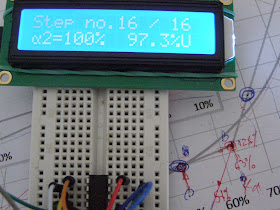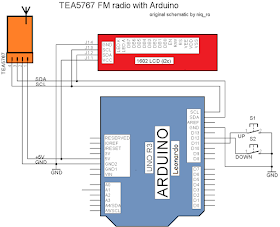A FM radio with RDS info and digital volume can be made with RDA5807 module, who is similar as TEA5767 (pcb board & pins).
For easy connexion, I made a adapter board from 2mm distance pins to 2.54mm:
I found a russian article with fm radio who use RDA5807 chisp at http://full-chip.net/arduino-proekty/97-cifrovoy-fm-priemnik-na-arduino-i-module-rda5807-s-graficheskim-displeem-i-funkciey-rds.html
with this schematic:
In this article is a movie named RDA5807 ФМ приемник на ARDUINO
In russian sketch I found some words in spanish language and after few search I see article Arduino Radio RDA5807 con RDS LCD Nokia 3310
I made some changes in sketch for optimal display of frequence value (my sketch is put on my Github channel - RDA5807_fmradio_3buttons_ver0.ino) for use with my configuration:
I made few test without audio amplifier:
after that, I put PC speaker at radio module, see RDA5807 FM radio with RDS info on Nokia 5110 display using Arduino (3) movie:
In I push MENU button, the cases are:
- AUTOMATIC SHEARCH:
- INFO:
- MANUAL SEARCH:
- VOLUME (16 steps, from 0 to 15):
I made some changes in sketch and now frequency and step volume are stored in EEPROM memory, see RDA5807_fmradio_3buttons_ver1.ino, see results in next movie: RDA5807 FM radio with RDS info on Nokia 5110 display using Arduino (4)



















































